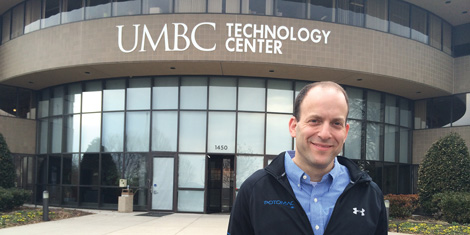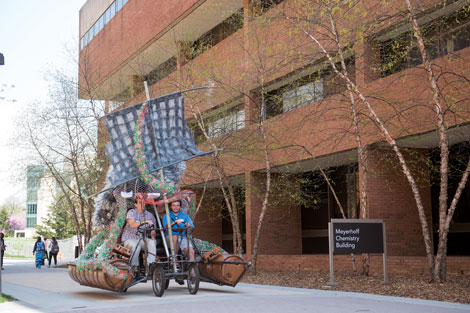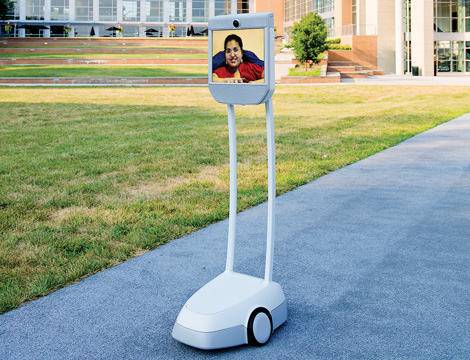Mike Adelstein ’96, biochemistry and molecular biology, gets excited by the littlest things.
As president and CEO of Potomac Photonics Inc., he leads a company that uses advanced manufacturing technologies (high-tech lasers and 3-D printing) to create and manufacture essential and ultra-tiny parts used in products ranging from space satellites to espresso makers.
Nearly every prototype that Potomac Photonics produces can fit in Adelstein’s palm, or his shirt pocket, and he keeps plenty of examples on hand to share with visitors.
“Look at this!” he says, eyes shining, as he produces a thread-like sample for examination. It’s a surgical suture, which is impressive enough at that scale. But, wait. There’s more!
“Our client needed micro-wells laser-drilled into the suture, where they could insert radiation,” he explains. And Potomac Photonics engineers rose to the task, figuring out how to drill 25,000 holes, each just one micron thick, in each of the tiny sutures. Doctors at Walter Reed Army Hospital are now using this technology to deliver highly localized treatment for breast and prostate cancer.
Adelstein says that devising these micro products, and the potential they have to improve everyday lives in so many ways, make him eager to arrive at the company’s headquarters in the university’s bwtech@UMBC Research & Technology Park each day. “We’re involved in fabricating devices to diagnose concussions, develop new pharmaceutical drugs,” he says. “The things we are doing are actually making an impact on the world.”
Adelstein joined Potomac Photonics as a sales administrator in 1997, not long after graduating from UMBC with a major in biochemistry and molecular biology. “UMBC was really tough for me,” he recalls. “Learning never came easy to me, but I persevered and I got through.” The university’s supportive faculty and collaborative student environment, he says, helped reward his perseverance with a structure for success.
That resilience served him well over the next dozen years. As Adelstein focused on growing the contract-manufacturing unit at Potomac, he also earned an M.S. in technology management from University of Maryland, University College and became a CPA. In 2011, Adelstein was promoted to become Potomac’s president and CEO. A year later, he led a buyout of the company.
Among his first acts after the buyout was to move Potomac Photonics from Lanham to bwtech@UMBC. The company completed its move to the university’s research and technology park in March 2013.
Ellen Hemmerly, executive director of bwtech@UMBC, worked closely with Adelstein to make the move to the research park possible. “Mike wanted to move Potomac Photonics here for all of the right reasons,” she observes. “He wanted to grow his company. He wanted to be affiliated with UMBC. He wanted to collaborate with faculty. And he wanted to hire students.”
Indeed, since the move to bwtech@UMBC, Potomac has grown from 18 to 26 employees. Adelstein points with pride to the fact that six members of his staff have affiliations with UMBC – either as graduates or student interns. “And that’s only going to be growing,” he says.
The company’s director of research and development, Amir Harandi, Ph.D ’14, mechanical engineering, is one of those employees with UMBC connections. He began working at Potomac as a graduate student, and stepped into his current role after completing his degree.
“Mike is a great CEO,” says Harandi, “and this is a great environment for an engineer. Research and development really is the driver of the company.” That drive and growth is demonstrated by the company’s current build out of 2,000 square feet of additional R&D space at bwtech@UMBC.
Adelstein is committed to creating a work culture where employees feel respected and valued — and where opportunity abounds. High school graduates who start as technicians at the company can receive training to become engineers, for example. And Potomac Photonics does pro bono work for organizations including the Boy Scouts of America and the U.S. Marine Corps.
“Potomac’s culture very much parallels what [President Freeman A. Hrabowski, III] has brought to UMBC,” says Adelstein, who was named UMBC’s Alumnus of the Year in natural and mathematical sciences in 2014. “Our core values are based on lifelong education, opportunity, social responsibility, diversity, collaboration, and hard work.”
— Sue de Pasquale
Tags: Fall 2015




